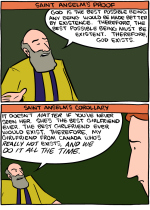Okay, so Lion IRC has taken the bait and defined "greatest" as "omnipotent."
Now if we can just get a clarification of omnipotent we'll be good to go. Can an omnipotent being make a rock so big he can't move it?
I guess a bit of clarification (or obfuscation, depending on how you look at it) is in order.
By simply declaring "omnipotent" as the definition of "greatest", I believe Lion IRC has completely abandoned the tenor of the conversation up to that point. As but one example, consider the following:
So if I understand you correctly you are not suggesting that a god exists, only that something exists that could be described as maximally great. In theory this will be true for any condition in which the nebulous term "great" is rigorously defined and quantifiable.
Otherwise it's meaningless babble. We're down to beauty-contest rules.
As I said earlier, I personally would find it hard to believe that there are no higher/greater beings anywhere in the universe/multiverse apart from terrestrial human life.
But one could, in theory, argue that the maximally greatest being they can conceive is a human.
abaddon was suggesting that there really isn't any category difference between bacteria and human. That would be a defeater of the ontological argument if accepted as true.
This is what I would call a gratuitous case of goalpost shifting. We are presented with the proposition that perhaps somewhere in the universe is a life form that is "greater" than us. When pressed to define what "greater" meant Lion IRC immediately jumps to "omnipotent."
The problem is that accepting the possibility that life forms more advanced than humans may exist in the universe somewhere is not even in the same ballpark as accepting the possibility that somewhere is a life form which can be described as "omnipotent." Again, what does that mean? Does it simply mean the most powerful thing in the universe? If so a supermassive black hole would be the maximally greatest being. Or maybe a pulsar, depending once again on whether one's is more interested in displays of kinetic energy or acquisition of potential energy.
If you say, "No, silly, I'm talking about things that are
alive" then you're stuck with defining what it means to be alive. Every life form we recognize today as being in that condition shares the characteristics of consumption of depletable resources, processing of said resources, excretion of waste matter from aforementioned processing, and the ability to reproduce. It is theoretically possible that life forms exist that do not share all of those attributes, but having never encountered any such life forms the rational thing to do is avoid making any life-decisions based on their existence until such time as they can be demonstrated to exist. Until such time rational people file such things under the category of fiction/fantasy.
That's not even counting the problem of the fact that the term "omnipotent" is self-contradictory. Can an omnipotent individual ever overcome a challenge? Can an omnipotent individual ever enjoy the gratification of acquiring a skill it didn't have before? There is an infinite number of potential activities that are contingent upon overcoming one's limitations, yet an omnipotent individual could do none of these things, meaning that it is not truly omnipotent.
As if that weren't bad enough you then get into the wrinkle of "omniscience." Surely a powerful individual who is knowledgeable about a great many things is more powerful than an equally powerful individual who is a complete idiot. Therefore from a purely philosophical standpoint an individual would also have to be omniscient in order to be omnipotent. And an omniscient individual who knows the future is more knowledgeable than one who does not, so one would not be truly omniscient unless one knew the future. And of course one who knew its
own future would be more knowledgeable than one who did not, so once again we're into a conundrum. Because if an individual knows its own future it is
completely powerless to make a decision. After all it already knows everything it will ever do, rendering it arguably the most helpless creature in existence. Even a fly trapped in amber doesn't know but what it might escape. But this pitiful creature is forever trapped in the amber of its foreknowledge, doomed to follow only the one fate in store for it without ever being able to shake things up. Truly a sad situation to be in.
If such a creature existed I'd possibly shed a tear in empathy for its sad plight. But for the time being I'm going to hold off because I'm fairly certain there is no creature anywhere consigned to this horrible existence.

